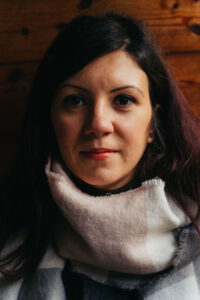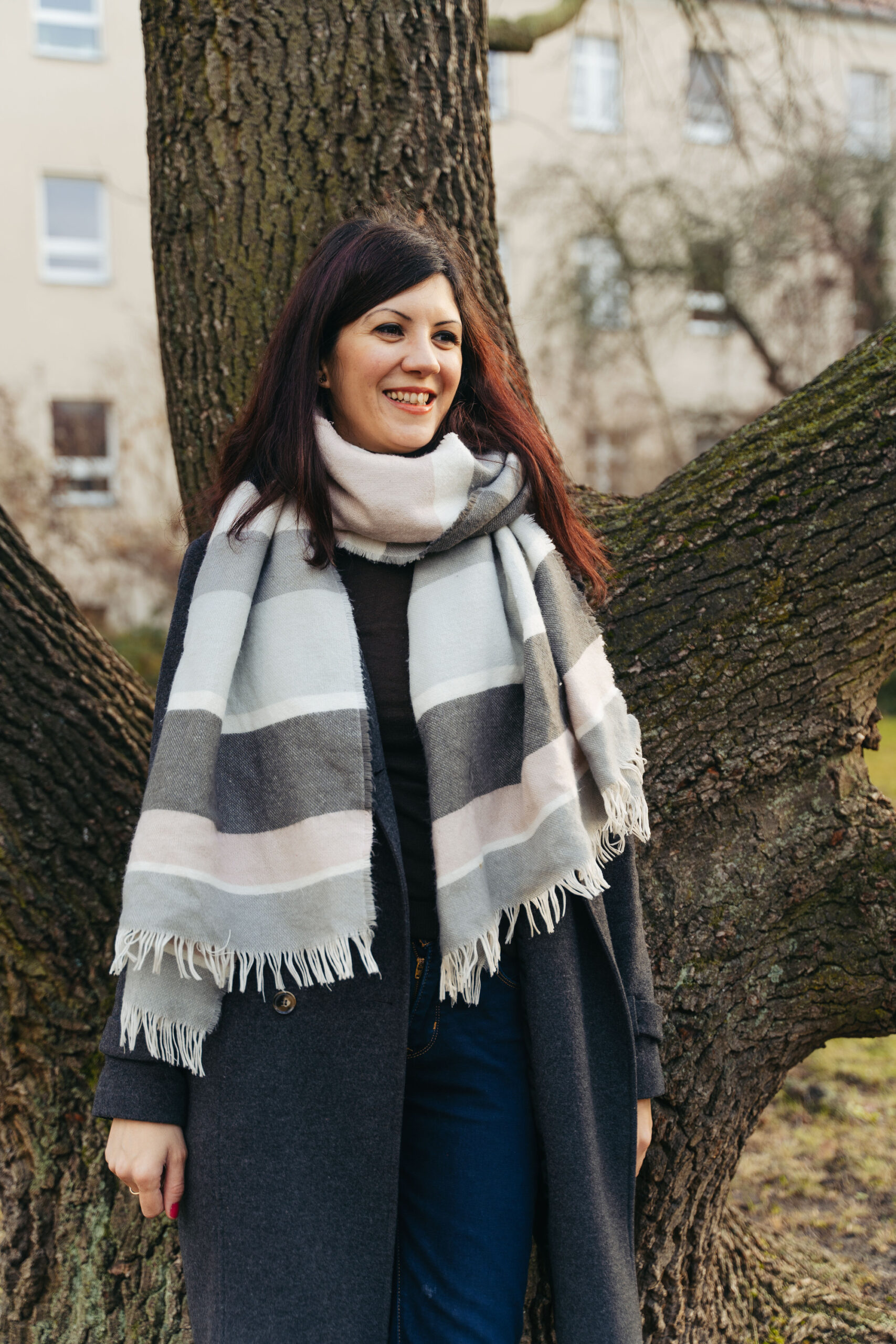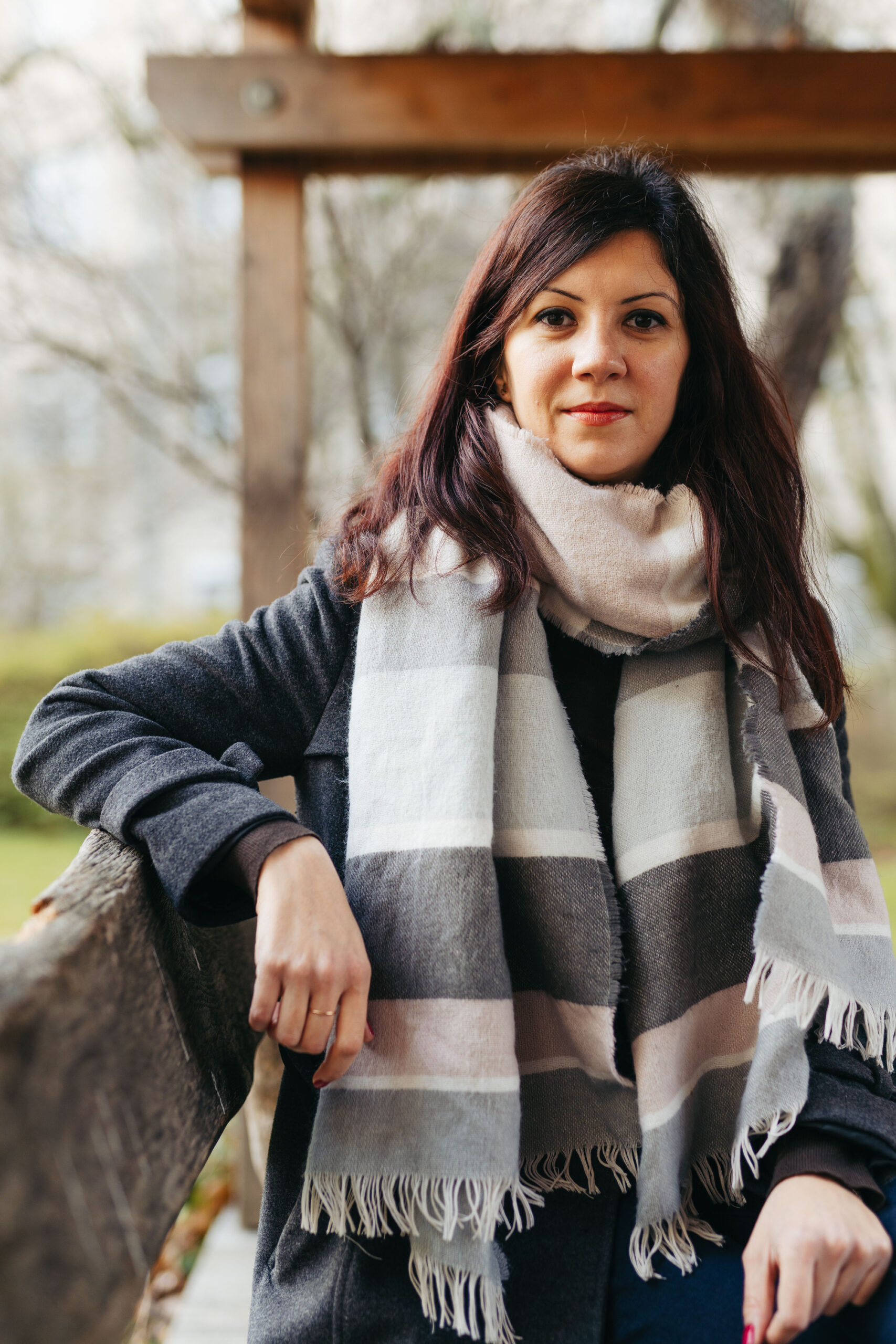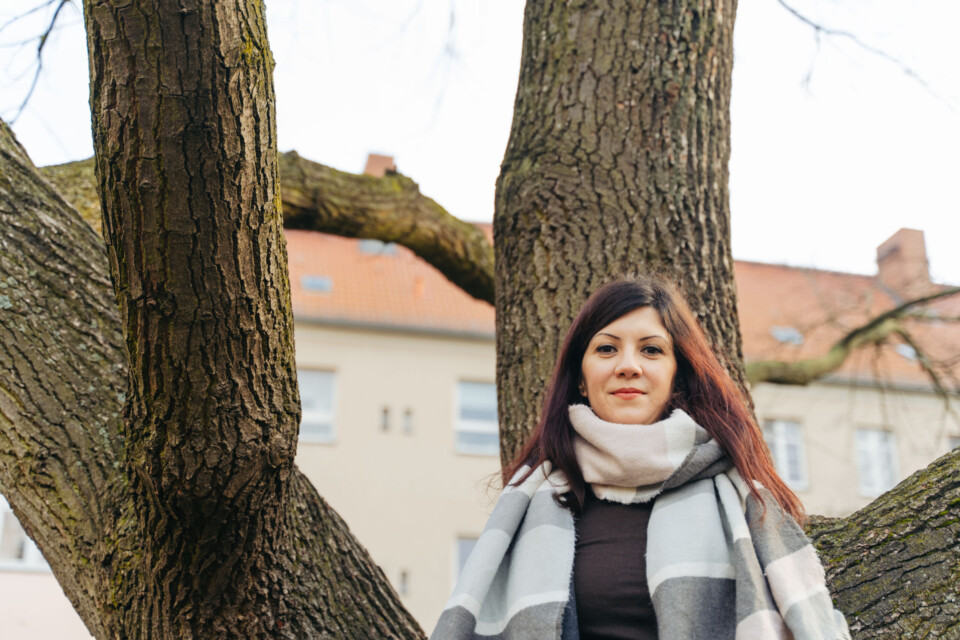I R E M
Berlin | 2021

I R E M
City — Berlin
Name — Irem
Age — 35
Love life — Married, 4-year-old daughter
Profession — Web Developer
Years in Berlin — 3
Location — Courtyard behind her apartment
T H E B E R L I N S T O R I E S
‘I TRULY
BELIEVE WOMEN
ARE BETTER
THAN MEN’

- What makes you happy? “Mostly the small things. If I’m feeling sad, down or moody and a friend texts me or someone greets me on the street, I immediately feel good again. Although I like to be on my own, I probably just needed that small moment of connection. But it’s not always about interaction. Just seeing a smiling child brightens my day as well. On the other hand, bad things influence me just as strongly. If I see two people arguing, I instantly feel sad – like it’s happening to me personally. I strongly believe that I can feel the pain or happiness in every human being around me, because we’re all connected. I’ve been aware of this since my teenage years and it can be really heavy to feel responsible for other people’s behaviour. Even if I don’t intervene, I usually try to solve those issues in my head and look for reasons or solutions. It’s exhausting that I’m making it my job to figure these things out. But it’s who I am. If other human beings were more like me, I think there would be less arguing and more empathy and understanding. So I try to stay like this, as hard as it may be. We’re all part of this big universe and if I manage to change something, that will affect the other parts and together we can make great change happen in the world.”
- What is your best personality trait? “I’m very straightforward. Most people don’t like that, but those who understand it, appreciate it. I want them to be just as honest with me. Of course it doesn’t mean I want to hurt their feelings; there are many ways to share your thoughts. Some people like to speak ill of their husband or mother-in-law, and I listen, but I try to stay objective and also share what I think their husband or mother-in-law might be experiencing. If this person knows me and is open to it, they might think about it some more and perhaps agree with me. But most people think friendship means always backing each other up.”
- What makes you different? “I’m deeply aware. Of the universe, of what’s going on around me, of people’s plans—or maybe I’m realistically aware that people can have plans that are different from what I would like. For example, you apply for a job and you think that the interview went well and that you really understood each other. And then they reject you. Maybe they don’t need you any more, maybe they want to hire their cousin—those are the truths in life that you will never know about. It happens everyday.”
- What is your biggest struggle? “I’m trying to understand the meaning of everything, but sometimes there is no meaning. Nevertheless, it’s important for me to find it in order to go on, otherwise I lose interest and will try to stay away from a situation or place. I’ve never stopped thinking about what the meaning of life might be; maybe because I’m not satisfied with the answers I’ve found. The hardest thing is that there could be so many possible meanings, I wish I could find one and stick with it! The cycle never ends, it’s like I’m running in a hamster wheel.”
- What is your greatest life lesson? “Luckily, I never experienced anything traumatizing or a major change in my life myself, but I’ve seen how your entire life can suddenly and dramatically change in just a minute. We all have to appreciate what we have and enjoy our lives, because a minute from now it might be gone.”
- What is your greatest dissapointment? “Humanity. Maybe I don’t have the right to say this, but my biggest disappointments are basically people. Every day I’m thinking about what humans have been doing to the world. Polluting the air, cutting the trees, raping women and children, killing our own race and killing animals—which is just as bad. Money is more important than human life. This is something I can not wrap my head around. I can only hope for change in a positive way.”

- What is the best thing that ever happened to you? “Probably the birth of my daughter. (With tears in her eyes:) Being a mother is hugely meaningful to me, because she’s going to grown into a woman, and as a feminist I think raising a woman is the most important task in the world. My daughter can become someone who changes many things in society and it’s in my hands to shape her like this. It’s a very big responsibility. They say men and women are equal, but to be honest, I don’t believe it. I think women are better than men in every respect. Life starts and ends with women, because I believe that you become one with Mother Nature when you die. But the fact that society and politicians have been implying for centuries now that it’s the other way around and that men are more important… just look at this world we ended up with, see where we are right now! If women could just be freed from those past experiences that taught us that men make the important decisions, men come before women, men have the right to say anything and women should stay quiet in the background and support their men… Only if women would step up and stand before men, and if mothers start raising courageous girls who’ll become better leaders in the future, only then I believe something will change and the world will become a better place to live in.”
- What is your greatest dream? “I don’t really think in terms of ‘greatest’, it feels too extreme to me. But I dream of being happy and of living in a society where I can express myself without being judged for my thoughts. That doesn’t mean that I’m dreaming of a society or a community where anyone is free to done anything, because I remember what one of my history teachers taught me: my right to hit you stops where your body starts. So I’m aware that freedom has limitations. You have to have some rules to live together as a society.”
- What is the best advice anyone ever gave you? “When I was a young girl, my parents advised me to only compete with myself. That way, if I failed, I wouldn’t have to worry about failing while others passed. I should only be worried about failing the next time. So I had to work harder in order to succeed later, but not because I was competing with others. It was very valuable advice that gave me confidence, because I only ever try to be the best version of myself, and always find a reason to motivate myself.”
- What advice would you give to other women? “It’s hard to be a woman. I mean, we are the ones responsible for raising and feeding the child. We’re the ones that are struggling the most during a global pandemic. We’re the ones who feel it the most when an economical situation changes, because we’re getting fired first or we’ll take care of the children after a divorce. But on the other hand, I believe that women are better, stronger and smarter creatures than men. We’re basically capable of doing everything on our own, although we’re often being portraited as helpers of men. So my advice for women would be to support each other, because only then something will change in the world. But women don’t always support each other and I often ask myself why. Maybe because we’re human and our desires, ambitions and egos get in the way. We have got to stop being selfish, and start being supportive.”
- Is there something you’re insecure about? “(Genuinely surprised:) No. Why would I be insecure? I’m OK.”
- Is there something you regret? “Actually there is. I think we should have moved from Turkey to Germany long before my daughter was born. We’ve been living in Germany for three years now, and I wish I could go back in time so we could have moved to Germany six years ago. Then my daughter would have been born here and I would have had the opportunity to get somewhere in my career by now, possibly in a mid-level job. I changed careers here in Berlin, I followed a one-year program for web developing, followed by an internship. Now I’m looking for another intern job to gain even more experience and confidence, before applying to a junior position, but it seems impossible to find one in the midst of a pandemic.”
- What does Berlin mean to you? “I try not to get attached to places or material things, so emotionally Berlin doesn’t mean anything special to me. But as a nature lover, I do like the inner courtyard behind our home with the beautiful garden full of trees. Logically speaking, Berlin is our gate to a better future. We believe that people here won’t be judged by their religious beliefs – which we don’t have – or political opinions, or race. And I really like it that Germany has Angela Merkel as Bundeskanzlerin (Federal Chancellor, ed.). In Germany we have better and more equal opportunities than we had in Turkey. You need lots of money in Turkey to receive the best medical care, get a good education or to be treated better in a restaurant or any place you go. If you don’t have money – you earn a minimum wage for example – you’re basically nobody. Life is hard for those people. The economical situation in Turkey is dire. For women and children especially, life is getting harder every day. Also, there is no freedom of speech. Lots of journalists in Turkey are in prison because of the things they wrote about the government. And the information they give your child at school isn’t objective or scientific, but mostly shaped by Islamic ideals. We didn’t see any opportunity for ourselves or our daughter in Turkey any more. But we were the lonely voice in the desert, we didn’t understand why the majority couldn’t see what was happening. It made us so sad. I believe life will be better in Germany. Of course, we miss our family and friends, but we only have a few of them left in Turkey. Most of them moved to other countries, just like us, looking for a better future.”
Photos by Luís Luz

